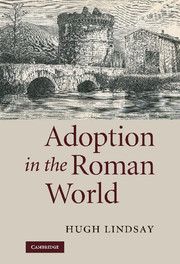Book contents
- Frontmatter
- Contents
- List of figures
- Preface
- List of abbreviations
- Introduction
- 1 Adoption, kinship and the family: cross-cultural perspectives
- 2 Kinship in Greece and Rome
- 3 Greek adoptions: comparisons and possible influences on the Roman world
- 4 Procedural aspects of Roman adoption
- 5 The testamentary adoption
- 6 Roman nomenclature after adoption
- 7 Adoption and inheritance
- 8 Roman freedmen and their families: the use of adoption
- 9 Adoption in Plautus and Terence
- 10 Sallust and the adoption of Jugurtha
- 11 Adrogatio and adoptio from Republic to Empire
- 12 Testamentary adoptions – a review of some known cases
- 13 Political adoptions in the Republic
- 14 Clodius and his adoption
- 15 The adoption of Octavian
- 16 Political adoption in the early Empire at Rome, Pompeii and Ostia; the imperial family
- Conclusion
- Glossary
- References
- Index
3 - Greek adoptions: comparisons and possible influences on the Roman world
Published online by Cambridge University Press: 25 January 2010
- Frontmatter
- Contents
- List of figures
- Preface
- List of abbreviations
- Introduction
- 1 Adoption, kinship and the family: cross-cultural perspectives
- 2 Kinship in Greece and Rome
- 3 Greek adoptions: comparisons and possible influences on the Roman world
- 4 Procedural aspects of Roman adoption
- 5 The testamentary adoption
- 6 Roman nomenclature after adoption
- 7 Adoption and inheritance
- 8 Roman freedmen and their families: the use of adoption
- 9 Adoption in Plautus and Terence
- 10 Sallust and the adoption of Jugurtha
- 11 Adrogatio and adoptio from Republic to Empire
- 12 Testamentary adoptions – a review of some known cases
- 13 Political adoptions in the Republic
- 14 Clodius and his adoption
- 15 The adoption of Octavian
- 16 Political adoption in the early Empire at Rome, Pompeii and Ostia; the imperial family
- Conclusion
- Glossary
- References
- Index
Summary
Adoption is an important institution in Greek life. Coverage on the area in Classical sources is uneven. The earliest surviving evidence is from the Gortyn Code, which provides evidence from about the mid fifth century bc, applicable to a Dorian community on Crete. The significance of the provisions of the Code has given rise to some controversy. There is a gap between the extant legal provisions and any idea of their operation in context. We are well served for Athens, partly because more is known about domestic life at Athens than elsewhere in Greece, and at Athens the evidence is clearest for the fourth century, since the topic frequently arises in the orators, especially Isaios. These cases often involve complicated inheritance disputes in which issues of status are crucial, and details of community feeling and social reality emerge. The context is hardly objective; the orators attempt to influence their audience to believe certain ways of reading situations. Those involved are of high status, and there is no hint of adoption further down the social scale. There is also dispute over the extent to which adoption at Athens has evolved since the Classical period.
- Type
- Chapter
- Information
- Adoption in the Roman World , pp. 35 - 61Publisher: Cambridge University PressPrint publication year: 2009

